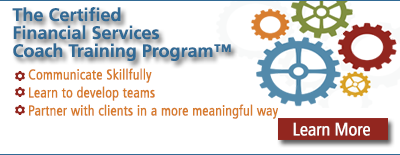Financial Advisors! Here are the 5 Hidden Benefits of Great Leadership
For many financial advisors it’s easy to fixate on the amount of money coming in. But it’s crucial to realize that money isn’t the driving factor for everyone around you. Your clients, for instance. They come to you to manage their money, and while they want you to invest it properly so that it grows, their concern is probably more centered around their financial security and maintaining their way of life. Likewise, your employees relationships with you seem financially driven as a means to support themselves, but the factors that keep them loyal to you go well beyond money. So do the factors that drive your success.
Consider this: A recent study by Forbes reported that the average tenure of an employee in the Unites States is 1.5 years. Perhaps surprisingly, the top reasons these employees choose to leave their jobs don’t have anything to do with money. They are:
There is no connection between their role and the bigger picture, i.e., they can’t see how they, personally, are making a difference.
They don’t feel a sense of empathy because no one is listening to them.
They don’t see a future or a path forward for them in their current role.
Financial advisors are in a human capital business that delivers wealth management services. Human capital is one of your greatest assets as an advisor looking to build a financial advisory team. It is not enough to simply hire a team of capable people, you must actively invest in their professional development. You pour hours into investment planning for your clients, and you should likewise actively plan to invest in your staff.
For financial advisory teams who partner with ClientWise, we immediately look at the nature of the work environment, and address areas in which the factors above might be causing a problem. At the end of the day, your greatest concern shouldn’t be your employees walking out the door, because the key is to shift their relationship with you and your team BEFORE it gets to that point. The great news is that you have the opportunity to do so starting today, by implementing the following:
Use the skills you already have: As an advisor, the relationship-building skills you use with clients are equally important in your relationships with employees. You should feel an obligation to understand their needs, desires, and future goals in the same way that you understand your clients’. Creating and fostering these kinds of relationships takes a certain skill-set that we teach in our Certified Financial Services Coach Training Program.
Create an environment where your employees are heard: We often stress the importance of creating common intent amongst staff and team members. Common-intent should form around an ambition that is significant in size, aspirational in scope, and possible to achieve, which will serve your clients, yourselves, and your organization. This is a process in which everyone on the team has the opportunity to contribute their ideas and knowledge to the larger vision and goals of the organization.
Create an environment of openness: Allowing your team members to be heard through common-intent will naturally lead to an environment in which they feel their thoughts are important, and will make them want to actively contribute. Once you’ve established common-intent, further create an environment of openness by inviting your employees to push back in instances where they disagree with you. Make it clear that the ultimate decision is yours as the team leader, but that they have the ability to contribute their ideas even if they are different from yours. This will prevent employees from bottling up their dissatisfaction or disagreement to the point that it hinders their ability to perform effectively. Don’t criticize or penalize them for being open and honest with thoughts on your process.
Focus on their futures: If you focus on the positive prospects ahead for your team members, they are more likely to volunteer their experiences to provide information that helps your future business as well. Encourage conversations about where your team members see themselves in three, five, even ten years from now. Establish opportunities for growth toward this vision in their personal and professional development. Even consider how these goals could be eventually realized in your firm.
Familiarize yourself with their role: Take the time to really walk through the responsibilities of your individual team members. Ask what works for them day-to-day and what doesn’t, or where they could use more or less support from you and the rest of the team. You might be surprised to find where and how things are falling through the cracks, and that there are simple solutions to address them without overhauling the process. Now only will this improve the productivity of your bottom line, it will also increase the confidence of your team members and make them more effective in their jobs as a result.
Coaching Questions from this Article:
- Do you have relationships with your team members that foster open and honest conversation?
- Do your individual team members contribute to the vision of your team? Do they feel that their ideas are heard and appreciated, even if they are different from yours as their leader?
- Do your employees understand d the complete process of your business and how their role fits into that larger picture? What about the larger picture of their future?
- Think back on former employees that have left your team, especially those you greatly valued. What, in retrospect, do you feel you could have learned from them before their departure and how does this inform how you approach your employees from this point forward?
Topics: Business Development Team Development Leadership Marketing & Communication


